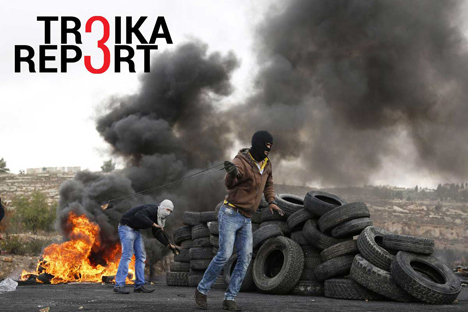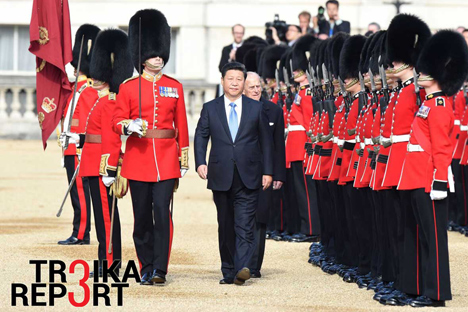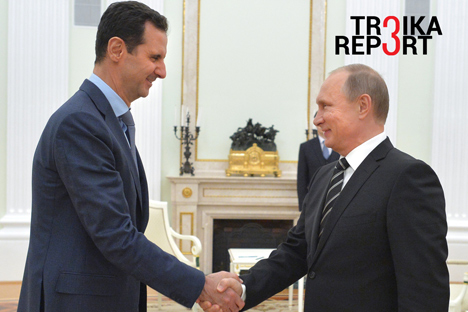Why Moscow is in no hurry to mediate Israeli-Palestinian conflict

A Palestinian swings a sling during clashes with Israeli troops near Ramallah, West Bank, Oct. 27, 2015
APThe ongoing unrest and tit-for-tat killings in Israel, pitting the Jewish authorities and the Palestinians against each other, has catapulted the conflict, which dates back to the end of WWII, to the top of the global agenda. It has also exposed the failure of international mediators.
The visit of U.S. State Secretary John Kerry, who quickly shuttled across the region, has not diminished the tensions. Kerry’s lightning visit was marked by a meeting with Palestinian Authority President Mahmoud Abbas and the King of Jordan, Abdullah II, as well as a plan to install security cameras at the al-Aqsa Mosque compound in Jerusalem. It did not go well with the Palestinians, who asked the question: Who is to monitor the monitors?
France has also thrown its hat into the ring: Paris has suggested involving 19 more countries in the peace talks, including Saudi Arabia, Norway, Ireland, China and the Arab League. It also called for international monitors to be placed in Jerusalem. On this occasion it was Israel that raised hell and objections.
The mixed reaction to the mediation plans proposed by the U.S. and France has sparked speculation that given Russia’s newly assertive profile in regional affairs it might step in and possibly offer an alternative pattern of a settlement. After all, long before the Oslo agreement in 1993, Russia was the co-sponsor – along with the U.S. – of the Madrid conference in 1990, now largely forgotten but which provided guidance for further talks on the decades-long misunderstanding between the Israelis and Palestinians, and still remains a valid legal foundation.
Is international mediation, including a higher profile for Moscow, a viable roadmap for a final settlement? Troika Report approached DanielaGrudsky-Eckstein, a senior diplomat with the political section of the Embassy of Israel in Moscow for comment:
“We have witnessed in the past three weeks a strong wave of violence, with Palestinian incitement bringing people into the street with weapons. It does not give much hope. It is a dreadful situation. We need a peace process. There are different diplomatic initiatives and we welcome these initiatives. We say to our counterparts, to the United States, to France and others, what we need now is direct talks with the Palestinians. The line between Jerusalem and Ramallah should not pass through New York or other international location. We should have one-on-one negotiations where we can resolve all the open problems, and finally find a way to calm down the situation.”
— Does the Israeli government have a blueprint for putting an end to the violence?
“I shall explain the Israeli policy: There is no change to the status of Temple Mount. Israel recognizes the importance of Temple Mount. We reaffirm our commitment to oppose any change of the status of Temple Mount. There is an offer that Prime Minister Netanyahu has made during these days — one-on-one direct negotiations using the help of counterparts; in this case it was Secretary of State Kerry but we welcome any other counterpart who is willing to help the negotiation process happen.”
— Can Moscow position itself as an honest broker within the ad hoc quartet formed to discuss a settlement in Syria (comprised of the United Nations, the United States, the European Union, and Russia) and breathe new life into the efforts to find a solution?
“Russia is one of Israel’s friends in the region. We welcome all the initiatives. In this case, the quartet is playing a positive role.”
“We think that Russia has an important role in this quartet.”
Yet Moscow seems to be keeping a low profile in the Israeli-Palestinian conflict. What is the reason for this? Grigory Kosach, an expert on the politics of the Arab world and professor at The Russian State University for the Humanities, made this statement to Troika Report:
“Russia could have played a more prolific role on conflict resolution since it has channels of communications open with Israel and also with various groups within Palestinian society, from Mahmoud Abbas to HAMAS. However, Russia considers both sides responsible for the tensions, and places them on an equal footing.
“This is unreasonable. Should Moscow say that it is incorrect for Israel to be soft on its right-wing activists who insist that the West Bank jurisdiction is non-negotiable since it is the location of Judeo and Samaria, ancient Jewish kingdoms? Definitely. Should Moscow warn Palestinians that it is inadmissible to use terror as a method to achieve their goals? It should. But Moscow is too weak to get involved in such a pro-active manner in this entrenched conflict.”
Another reason for Moscow distancing itself from the present resurgence of violence, with the specter of a third intifada on the horizon, was spelled out for Troika Report by Sergei Filatov, a commentator with the Moscow-based journal International Affairs. In his view, Moscow is in no position to commit itself to mediation on the Israeli-Palestinian issue since it is fully consumed with efforts to settle the conflict in and around Syria. Not until the Syrian settlement is signed, sealed and closed can Moscow redirect its attention to other regional rifts and schisms.
However, the opportunity for Russia to play a stronger role in attempts to resolve the Israeli-Palestinian stalemate may present itself in due course. It is a hardly a secret that the Obama administration is performing a awkward balancing act: concealing its aversion to Israeli Prime Minister Benjamin Netanyahu (who happens to be on friendly terms with Russian President Vladimir Putin) and at the same time averting any suspicion that the U.S. is dumping Israel as its longest serving strategic partner in the region.
Yet Israeli officials and experts warned a long time ago that the U.S. will eventually distance itself from the Holy Land, and the nuclear deal with Iran is seen as a solid proof that this is now occurring.
Under the changing regional balance of power and allegiances, Russia has the credentials to get involved in mediation on the Israeli-Palestinian track. But probably not until the Syrian dossier is closed. And it still has to be written.
More inspiring stories in your box!
All rights reserved by Rossiyskaya Gazeta.
Subscribe
to our newsletter!
Get the week's best stories straight to your inbox

